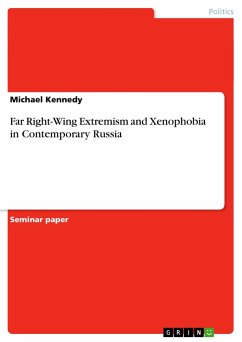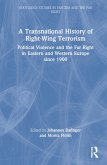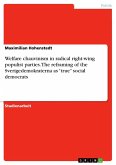Seminar paper from the year 2013 in the subject Politics - International Politics - Region: Russia, grade: A, Webster University, language: English, abstract: Since the collapse of the Soviet Union, the Russian Federation has witnessed a marked and progressive increase of extreme right-wing ideology, which has led to violent interethnic clashes, terrorism, outspoken government officials calling for neo-imperialist expansion, and as some would argue - war. Along with Russia's relative prosperity and stability following Vladimir Putin's rise to power at the turn of the century, Putin has gained strong widespread support and will surely be re-elected in March 2012. However, the Russian government under Putin has indirectly allowed for the evolution of an extreme right-wing movement through its policies and lack of action toward preventing attacks. Nevertheless, it is generally accepted that Putin is not responsible for creating or orchestrating a movement that has in many cases beenresponsible for lethal violence. It was in 2004 that the Russian Federation experienced the most dramatic increase in militant hate crimes on non-Russian ethnic groups with 215 people injured and 49 killed. Following this, 414 were injured and 47 killed in 2005, and 485 injured and 54 killed in 2006 (Varga, 2008). These findings demonstrate the rapid growth in support of such hate groups, or at least the frequency of attacks and demonstrations. This suggests that the continued rise of xenophobic hate crimes is not likely to lose momentum. The factors that have played a part in developing the spread of far right ideology include political parties, radical individuals within government, and nationalist groups and associations.








